When talking with Azurá Stevens, there’s a recurring theme to her success: the value of putting in the work. Whether it’s starting a food truck business with her father or learning the lesson of practicing with intention, over and again she has reaped the rewards of her efforts.
The WNBA star for the Los Angeles Sparks joined me for a conversation from the team’s practice facility. Through the course of our conversation, one thing became clear: She learned early on the significance of cause and effect. Whether it was her time at Duke University or when she transferred to perennial power UConn, the facts didn’t lie.
Take the food truck, for example. Prior to the pandemic, Azurá and her father Damon were kicking around restaurant ideas. She says that following some research, they decided to start small — hoping to offer something in their home community of Raleigh, North Carolina that was lacking.
“He did most of the planning,” she says of her father. “But we were just talking one day about how could we put me being a basketball player and having a lot of notoriety in that area and him being a chef together and merging that together.”
The equation was simple: Make good food and people will flock. First, you need a chef. Her father checked that box.
Then you need a truck. But it’s more than finding an old box truck and building it out. When you have a family that’s unusually tall — Azurá is 6-foot-6 — you need to account for that. Turns out, one sister is studying engineering. Box checked. Another sister is an artist. She designed the logo for Same O Dame O’s. Boom. Now it’s meals on wheels.
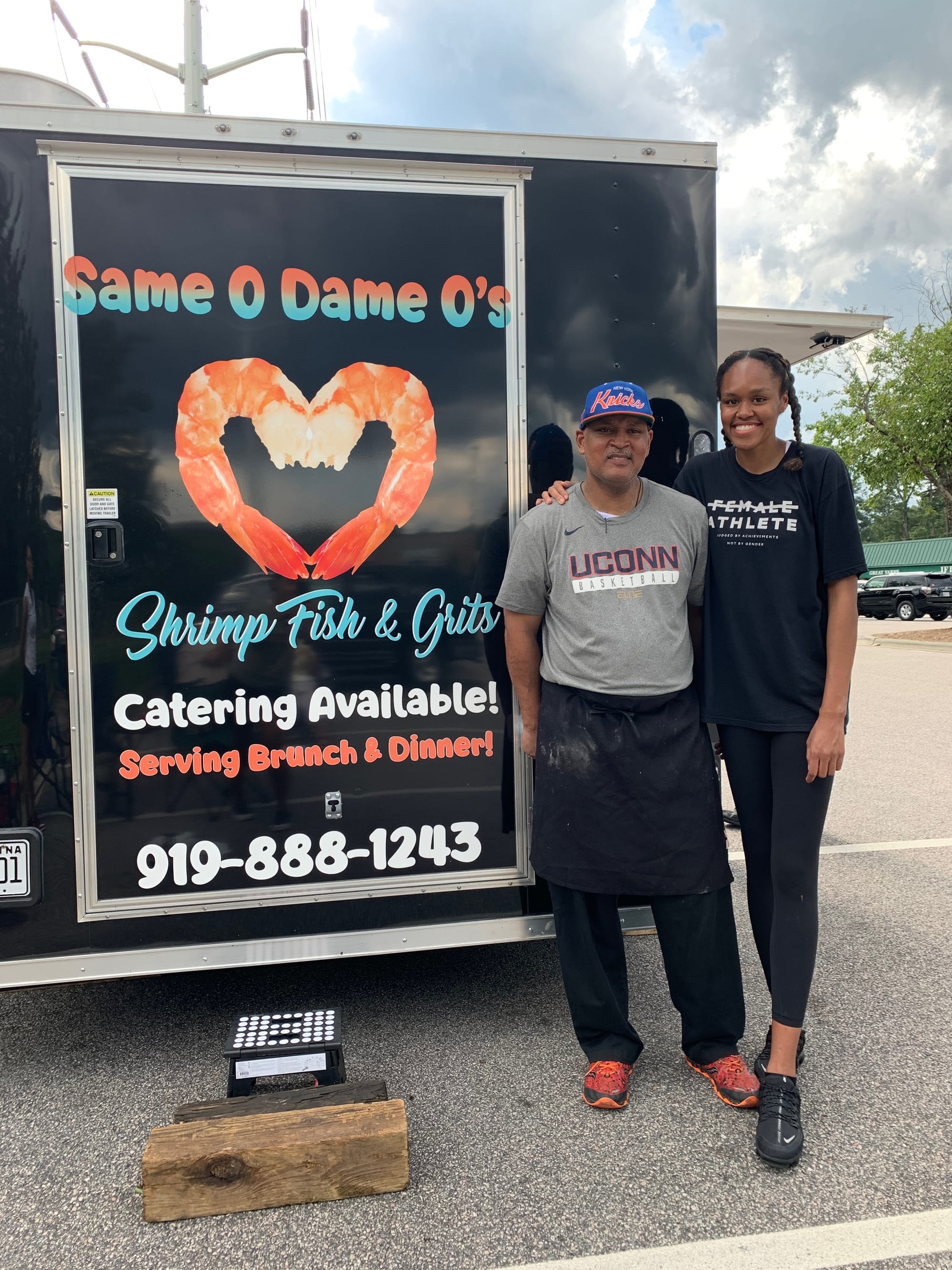
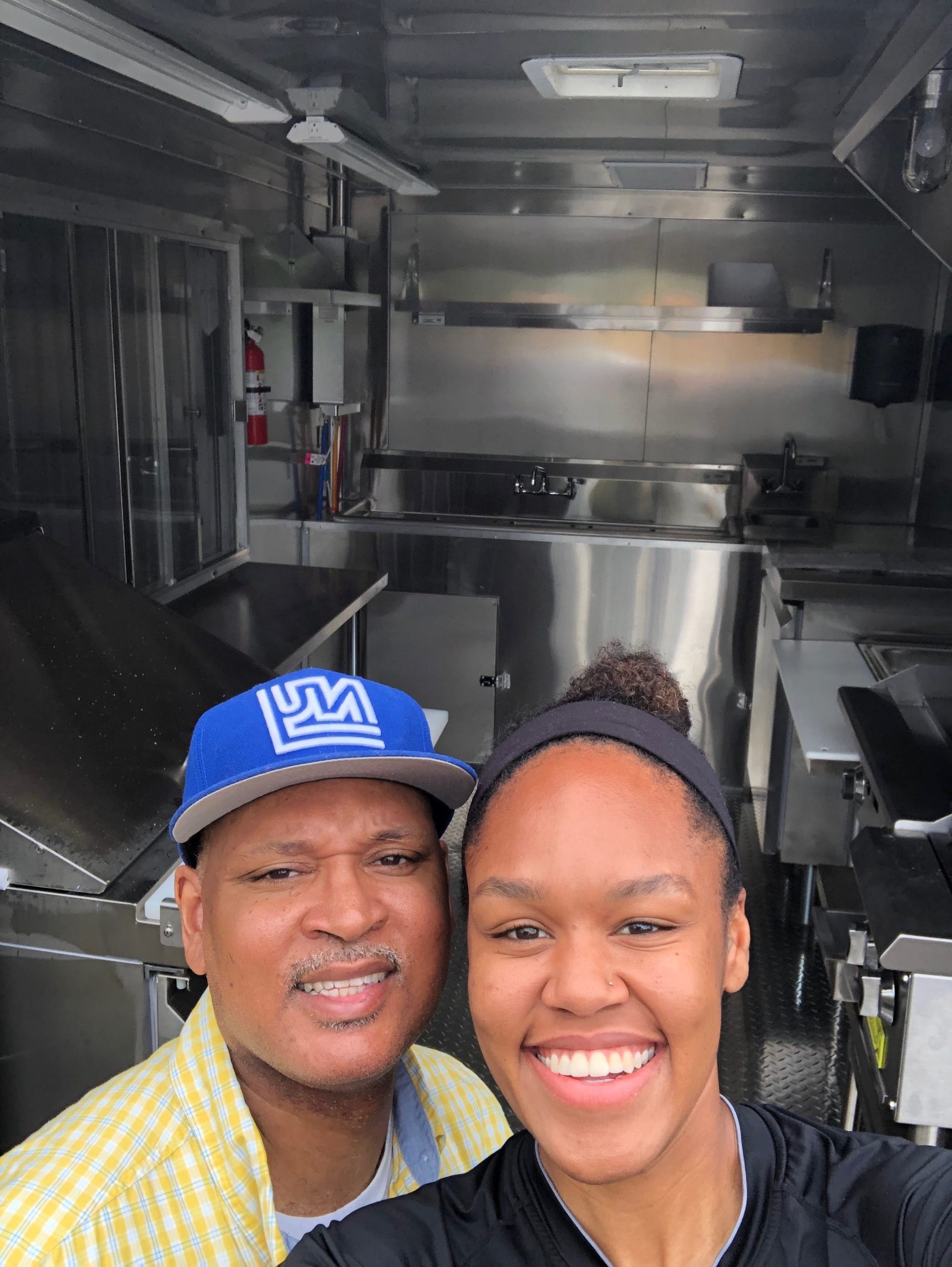
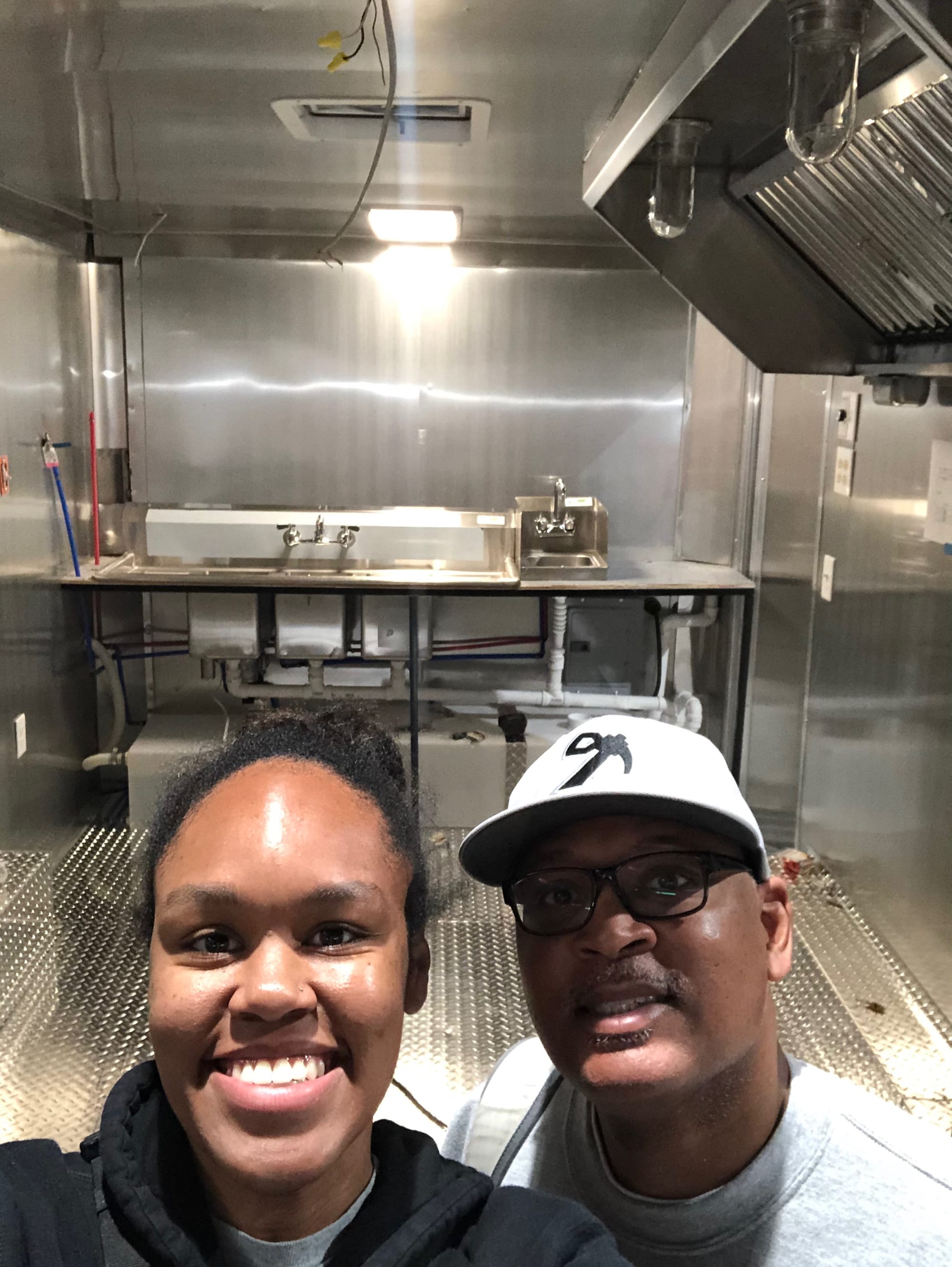

Azurá and her father Damon opened a food truck together in their Raleigh, North Carolina community. [Courtesy photos]
“My dad found some people that build trucks from scratch. So my sister is studying engineering in college right now, and so she kind of helped put the floor plan together for the truck with the dimensions and everything just fitting, like the fryers, the steam table, all of that,” she says. “But the height definitely was something that was considered. It has plenty of room in there for me.”
It was a family effort to develop what’s become a family business. Her father now had what he needed to make his favorite dishes, and the Raleigh population is the beneficiary of the blood, sweat and … grits.
“It's fish, shrimp and grits. The main thing is the simple grits, but he added fish and chicken and then, sometimes he adds a few different things. Changes it up seasonal, like for winter months versus summer months.”
During the offseason, Azurá joins him in the truck. But when I asked if she gets behind the grill, she laughed and deferred.
“I'm not much of a cook. I can, I can,” she says with emphasis. “I've watched so much just helping work events and stuff so I can cook, but I usually am doing more of the plating. And then either my mom or someone else that we have working will do the window, but I usually am in the middle.”
Teamwork makes the dream work.
Azurá’s introduction to basketball came early. Her father took her to the YMCA, where she immediately embraced the sport around age 5. Her impressive height followed her through those early years, offering an obvious advantage to accompany her skill.
“I was tall pretty much since I was younger. So I even remember in kindergarten or first grade, when we took our class pictures, I would always be the last one in the back because the tallest would be in the back,” she says.
A steady progression in her game was next. While she dabbled in track and field during middle school, she began to notice around eighth grade that she was just … better. Better than her basketball contemporaries. And better than some of those older than her.

“Going into my freshman year, I had a team camp with my high school. And I remember getting an (college) offer then and that's when I really had it solidified that like, ‘Ooh, I'm better than all my teammates and a lot of people that I'm playing against.’”
And so it began. The dizzying, confusing, flattering, maddening, exciting time of being a recruited athlete. Now 29, Azurá remembers feeling overwhelmed by the attention, the decisions and the impact on her future life.
“You know, you're just so young and it's a big decision that you have to make, in terms of where you want to go and study and also compete as an athlete. But I just remember getting tons and tons of letters in the mail, and sitting down with my parents and being like, ‘Okay, I really need to try to make some sense of what I want to do moving forward.’
“Do I want to stay in state? Do I want to go out of state? That's kind of how I started to break it down. And then obviously looking at different programs and their success and what they had to offer both on and off the court. But initially, definitely feeling really overwhelmed. But I remember sending out just kind of like a mass email to a lot of schools just saying ‘thank you for considering me.’”
Like most sports, basketball has a pecking order of desirable schools. While they differ for men and women, the identity as a “basketball school” matters. Azurá made a list that included three schools in state: Duke, North Carolina and North Carolina State. She added a fourth — Maryland — “because I didn’t want to go too far at first.”
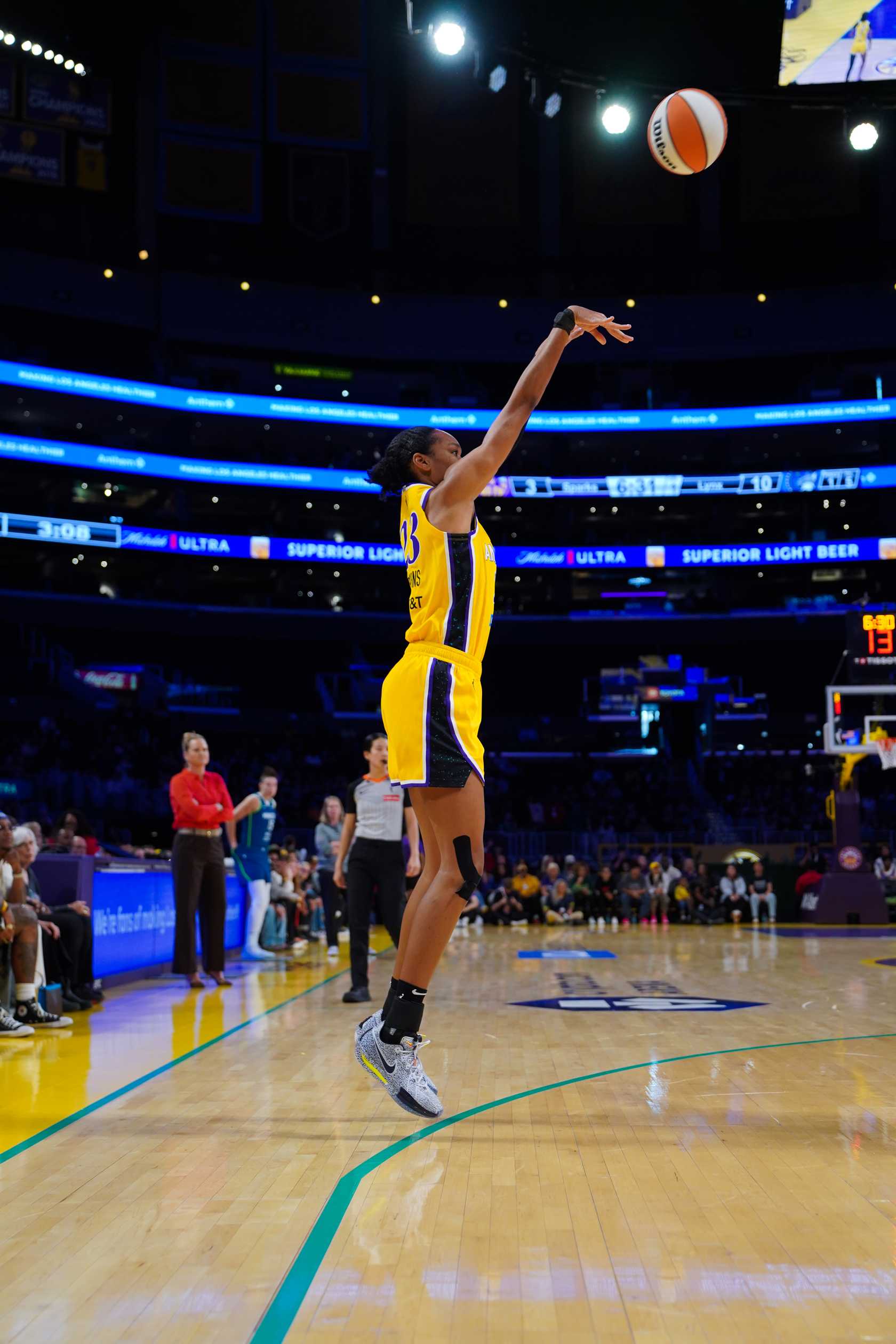
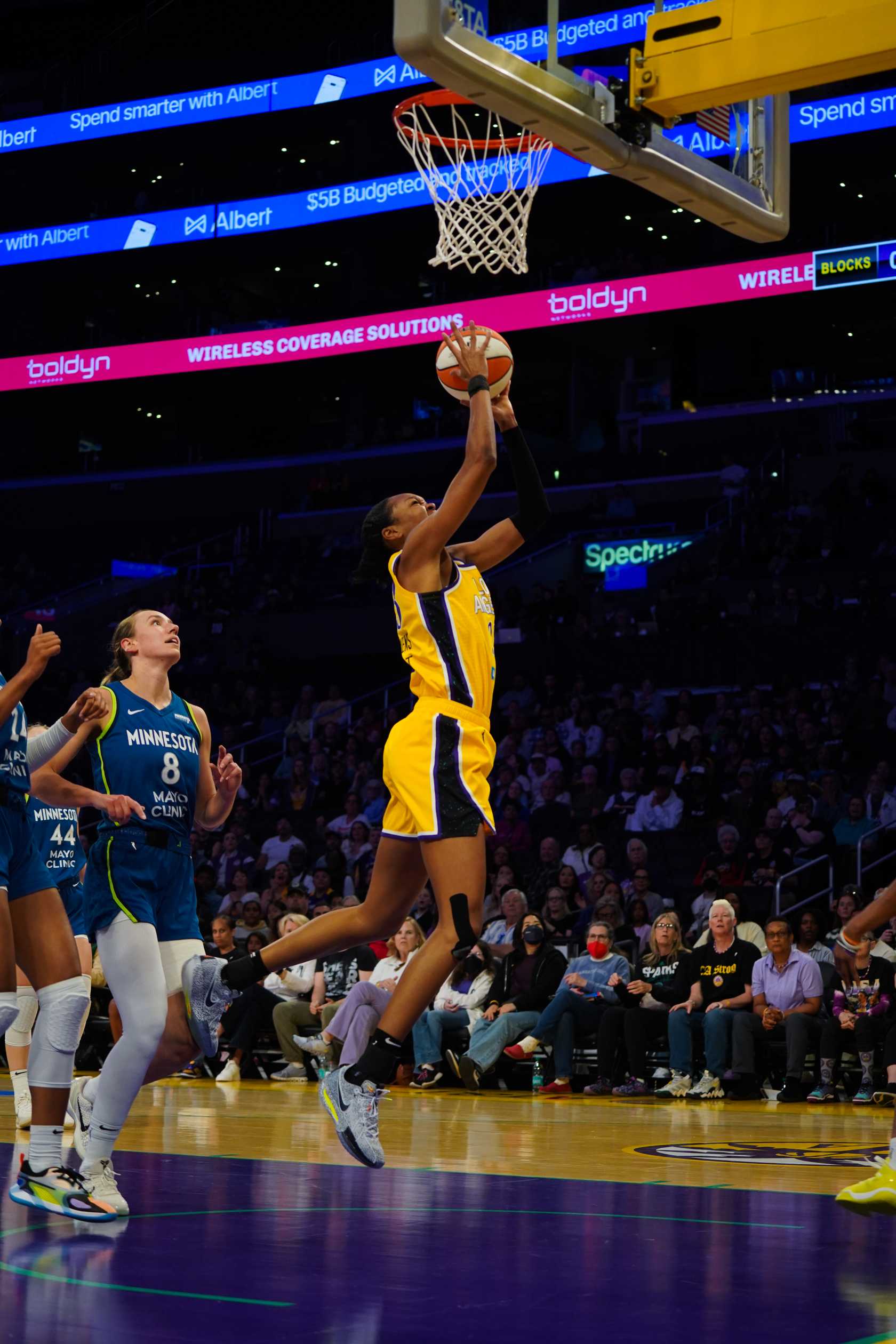
Azurá brings a veteran presence to the Los Angeles Sparks. [Courtesy photos]
In the end, Duke won the sweepstakes. A traditional basketball school in every sense with the hallowed Cameron Indoor Stadium and a bevy of banners in the rafters.
“That was my number one choice for staying close to home,” Azurá says. “Because it was just far enough that it wasn't too close and just the prestige of Duke, as a basketball program, but also academically. I just felt like it would be such an honor to be able to go to a school like that.”
All the vibes she sought were found in Durham. When she was a freshman, the women’s team made the Sweet 16 while the men’s team won the national championship. It felt like a slice of heaven.
“I vividly remember going to a lot of their different games, especially my freshman year, they won the championship. So that was like really, really cool. Watching those guys that came in with us just go and compete and win.”
Into her sophomore season, the shine began to wear. It felt like something else — somewhere else — was calling her. This was pre-transfer portal, when athletes who wanted to switch schools had to sit out a year. This was a heavy decision.
“I just was looking for some change. And I think after a couple years of being in school, I was like, ‘You know, being away from home wouldn't be too bad. It's not as daunting as I guess I thought it was coming out of high school. So I opened back up my recruitment, told everyone I was transferring, and then just kind of was seeing what schools were going to come.”
Now an established college player from a major Division I school, she had no shortage of suitors. So when the bluest of blue bloods in women’s college basketball came calling, how do you say no?

Of course, she couldn’t. And didn’t. Legendary University of Connecticut coach Geno Auriemma made the pitch.
“It was a no-brainer,” Azurá says. “From that point, just to have a coach like that want me to come and be a part of their program. And I'd played with some of the players on the team already, so I had some familiarity with some of my teammates.
She saw it as a once-in-a-lifetime opportunity.
“When he came calling, it was a pretty easy decision for me.”
Maybe for the first time as an athlete, Azurá was being thrown into a fire she didn’t fully recognize. This one burned hotter. It made her focus and prepare in a way she hadn’t previously. It was the UConn way.

“It doesn't matter if you're playing 40 minutes or you're playing no minutes, the expectation is the same for practice, and for games.
“But just in general that expectation and to strive for excellence is the same. And it really helps you to adapt your mentality, to want that for yourself eventually. So I think that was the cool part of when I was able to look back on my time there, just the growth that I experienced as a player and a person.”
The biggest change, she says, involved preparation — that thing mentioned up top about putting in the work. Do it today, and it pays off tomorrow. That’s true in the daily grind of college student-athlete life. But it also prepared her for the next level: pro ball.
“I remember when we would have practices, they were really challenging. But then when we got to the games, they weren't easy. But, you know, it just became a way of how you approached the game because we went so hard in practice every day. But the way that you approached it was just on a 100 every day. So I think that was one of the biggest things I had learned from being there. And Geno, he’s the one who demanded that excellence from us, day in and day out.”
One memory from UConn that carried Azurá into the WNBA was the end of practices. After the brutal tempo, the expectations and the mental grind, after game-speed and conditioning, Auriemma would have them shoot until their arms felt like they’d fall off.
The shooting. Reading and reacting. The coach was teaching student-athletes to be … students of the game.
“So being able to develop that skill to really read and react different actions was really, really valuable. And then just everything about our practices made sense. We would use shots like when we were tired, which is similar to how you are in the game. Just really moving with the right intention, I thought was really eye opening for me to experience that, coming from Duke going there.”
Which made turning pro more likely, and the adaptation to pro ball a shade easier.
“That's one of the things that really drew me to wanting to go to UConn was just the pedigree that they have there. I mean, the amount of pros that we have in the league — those are the results. And so, I knew going there that I would be prepared to come into the league and not just come into it, but be able to make some noise and, and really hold my own.”
Azurá was drafted sixth overall by the Dallas Wings in 2018 and made the All-Rookie squad. In 2020 she was traded to Chicago, where she won a WNBA title. She played in the Windy City until 2023 when she joined the Sparks.
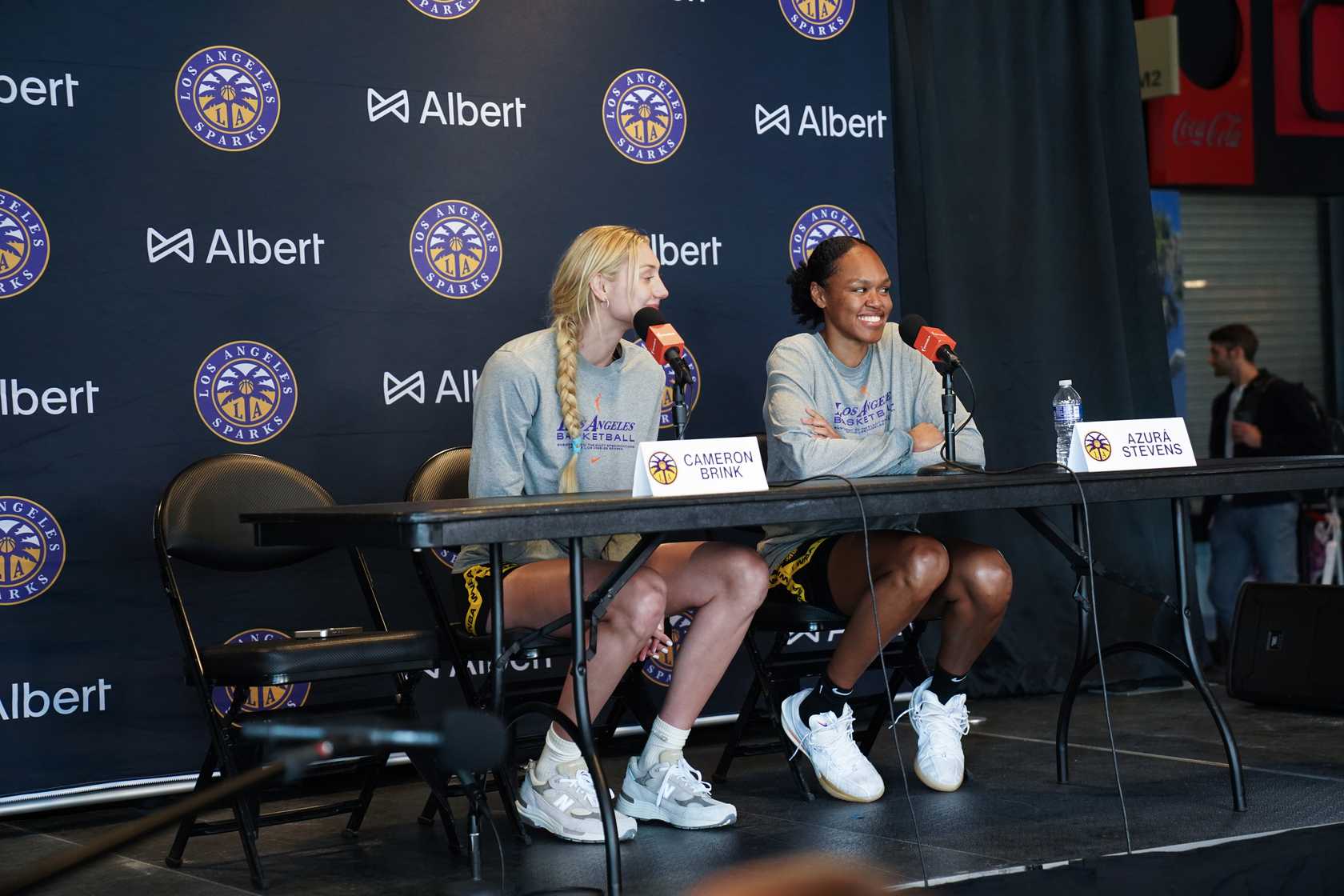
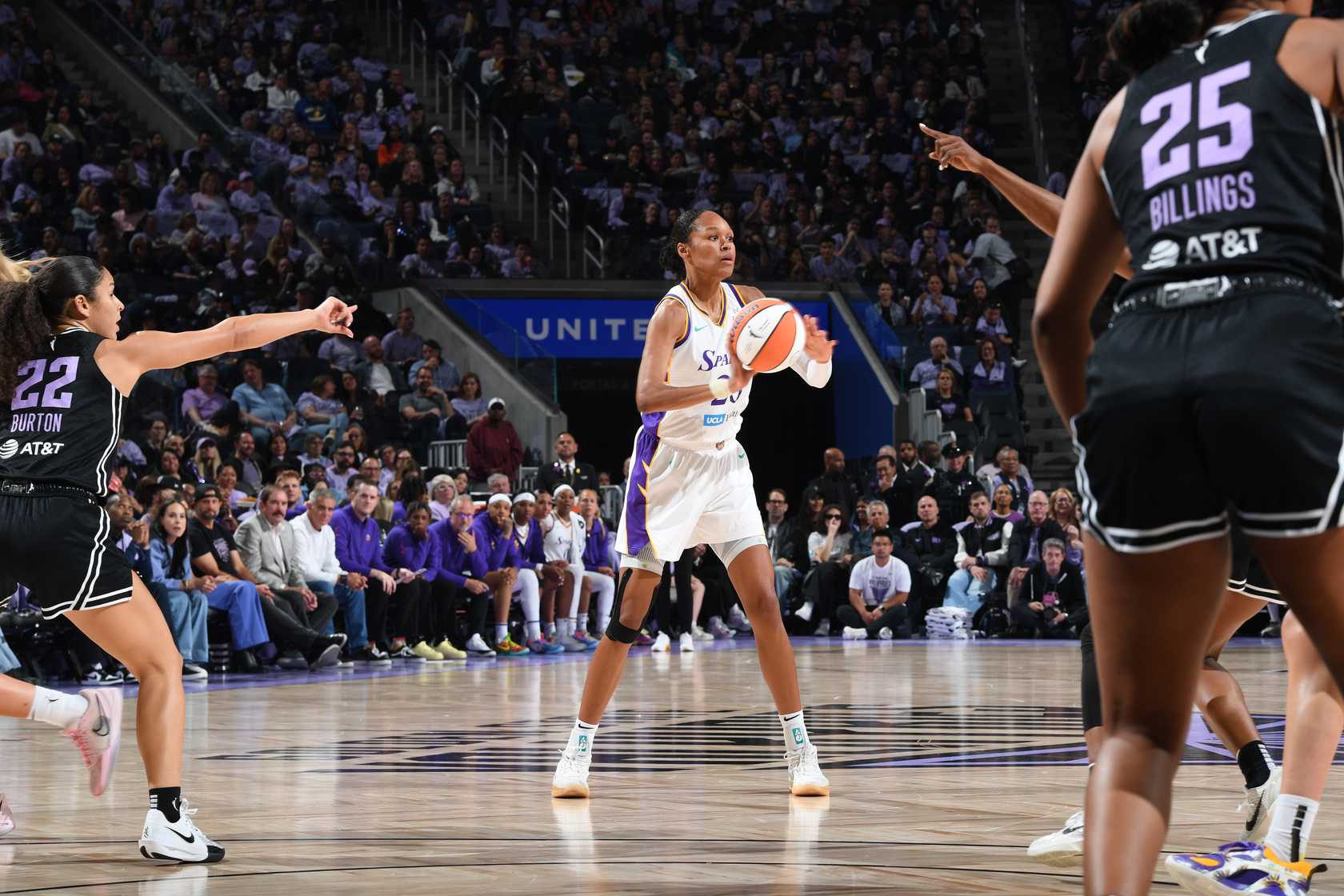
Azurá credits her time at UConn for preparing her to play professionally. [Courtesy photos]
Now considered one of the best bigs in the league, she has taken her talents to Europe in the offseason (Turkey) and joined the Unrivaled 3 vs 3 league, where she recently teamed with Brittney Sykes, Kahleah Copper, Angel Reese, Lexie Hull and Chelsea Gray to win the inaugural championship for Team Rose.
While she intends to play as long as she can, Azurá has started that long gaze toward a horizon that once seemed distant. She holds a degree in psychology but feels like the tractor beam of basketball will keep pulling her close.
“I want to stay involved around the sport, maybe more in a management role. I don't really know if I want to coach. But I haven't gotten to that too, too much. I still want to play as much as I can. But yeah, maybe something in ownership or, you know, GM role or something like that.”
For now, Los Angeles is treating her well. She enjoys the food scene — there are currently no plans for Same O Dame O’s West — the beach and hanging with her cat.
“Being out here in L.A. has been really cool. Just being able to go soak up the sun and being so close to the beach. I grew up around nature, so I'm always down for a nice walk, just getting out in nature … just taking it easy.”
Matthew Fults is author of the award-winning novel, The Scotland Project, available from your favorite bookseller. Its sequel, Messenger for the Dead, is available for pre-order.